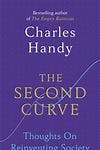Take a walk. Preferably somewhere you can let your mind wander as your body wanders. Perhaps in park or other urban greenspace. Perhaps in some farmland. Or on a quiet canopied forest trail. Or on a beach, quiet save for the sounds of waves and the breeze and the paws of your yellow Lab.
Talk a walk. And after you do, outdoors or inside, settle in to read some Charles Handy. Not just any Charles Handy, although there are more than a dozen provocative books from which to choose.
Handy will challenge you. He has this notion that there’s a natural rising and falling to all individual and collective activity. He has this notion of pursuing new direction, a second curve, before the first curve peaks. “The Second Curve is our chance to make up for any shortcomings on the first curve, to redeem ourselves and to show we have learnt from the past in order to create a better future,” he claims. Indeed, for companies and all who work in them, growing “different rather than bigger” can be “more satisfying, and often more profitable,” Handy contends.
Lest his notions seem inadvisable messing with actual or potential success, Handy insists that individuals, groups, governments, communities, and companies all “need to challenge orthodoxy, think unreasonably and dare the impossible if we are going to have any chance of making the future work for all of us, not just those favoured few.”
...Handy will challenge you with his several searching questions."
Charles Handy will challenge you with his several searching questions: Is more always better? Should businesses and other organizations be more democratic? Do we need a new capitalism? What is the nature of work? What is learning and how does it differ from thinking?
Charles Handy asks, “Is it not time to return to the idea of a business as a responsible community that pays due heed to all its constituents, one whose core purpose must be to seek immortality through continuous self-improvement and investment?”
The answer is not a simple “yes” or “no,” for Handy’s question is far more complex. He is challenging all who would engage him in dialogue—and those who would not—to examine principles as seemingly abstract as justice and fairness and as everyday as profits and losses.
He challenges all those who would lead, for those who would talk, for those who would walk the talk, to do more than think about the second curve. He challenges us to explore the paths yet untraveled. To confront the different and to make a difference.
This is another in a series of occasional essays by John S. McClenahen, an award-winning writer and photographer who for four decades covered international economics, public policy, and management principles for IndustryWeek.
About the Author
John McClenahen
Former Senior Editor, IndustryWeek
John S. McClenahen, is an occasional essayist on the Web site of IndustryWeek, the executive management publication from which he retired in 2006. He began his journalism career as a broadcast journalist at Westinghouse Broadcasting’s KYW in Cleveland, Ohio. In May 1967, he joined Penton Media Inc. in Cleveland and in September 1967 was transferred to Washington, DC, the base from which for nearly 40 years he wrote primarily about national and international economics and politics, and corporate social responsibility.
McClenahen, a native of Ohio now residing in Maryland, is an award-winning writer and photographer. He is the author of three books of poetry, most recently An Unexpected Poet (2013), and several books of photographs, including Black, White, and Shades of Grey (2014). He also is the author of a children’s book, Henry at His Beach (2014).
His photograph “Provincetown: Fog Rising 2004” was selected for the Smithsonian Institution’s 2011 juried exhibition Artists at Work and displayed in the S. Dillon Ripley Center at the Smithsonian Institution in Washington, D.C., from June until October 2011. Five of his photographs are in the collection of St. Lawrence University and displayed on campus in Canton, New York.
John McClenahen’s essay “Incorporating America: Whitman in Context” was designated one of the five best works published in The Journal of Graduate Liberal Studies during the twelve-year editorship of R. Barry Leavis of Rollins College. John McClenahen’s several journalism prizes include the coveted Jesse H. Neal Award. He also is the author of the commemorative poem “Upon 50 Years,” celebrating the fiftieth anniversary of the founding of Wolfson College Cambridge, and appearing in “The Wolfson Review.”
John McClenahen received a B.A. (English with a minor in government) from St. Lawrence University, an M.A., (English) from Western Reserve University, and a Master of Arts in Liberal Studies from Georgetown University, where he also pursued doctoral studies. At St. Lawrence University, he was elected to academic honor societies in English and government and to Omicron Delta Kappa, the University’s highest undergraduate honor. John McClenahen was a participant in the 32nd Annual Wharton Seminars for Journalists at the Wharton School at the University of Pennsylvania in Philadelphia. During the Easter Term of the 1986 academic year, John McClenahen was the first American to hold a prestigious Press Fellowship at Wolfson College, Cambridge, in the United Kingdom.
John McClenahen has served on the Editorial Board of Confluence: The Journal of Graduate Liberal Studies and was co-founder and first editor of Liberal Studies at Georgetown. He has been a volunteer researcher on the William Steinway Diary Project at the Smithsonian Institution, Washington, D.C., and has been an assistant professorial lecturer at The George Washington University in Washington, D.C.

